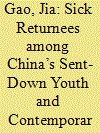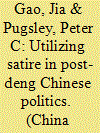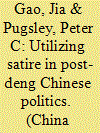| Srl | Item |
| 1 |
ID:
180007


|
|
|
|
|
| Summary/Abstract |
China’s first cohort of the sent-down youth during the Cultural Revolution has since its early years attracted considerable research interest and been analysed from a few different viewpoints. However, the gradual retreat from executing the sent-down policy, especially bingtui (return to urban centres of origin because of medical reasons) as the then widely used tactic, and its long-term impact on people’s socio-political attitudes and behaviours have not been examined and evaluated adequately. This has resulted in a large discrepancy between the non-academic discourse of returning sent-down youth, including bingtui, and the academic literature on these aspects in both Chinese and English. As revealed by many non-academic publications, bingtui not only represented the emergence of a widespread popular resistance to the Maoist Cultural Revolution that involved mobilising those who were then sent to the countryside, but was also believed to be responsible for a surge in what has since become known as songli feng (a wave of gift-giving practice). Based on the information recorded in published personal memories of many sent-down youth and other published accounts, online and print, as well as the information collected from my own past observations and recent interviews, this article will go beyond both glowing and condemnatory documentations of the sent-down movement of the late 1960s and 1970s and seek to analyse how bingtui was started, how it was utilised by sent-down youth and their families and, importantly, how it had led more Chinese people to realise that certain aspects of their identity could be performed.
|
|
|
|
|
|
|
|
|
|
|
|
|
|
|
|
| 2 |
ID:
085011


|
|
|
|
|
| Publication |
2008.
|
| Summary/Abstract |
Although China's institutional campaign against the Falun Gong has been closely observed and analyzed, researchers have failed to take note of the subversive power of satire utilized in the comic theatrical skits (xiaopin) of popular comedian Zhao Benshan to ridicule the Falun Gong. This exemplifies the Chinese Communist Party's long-established political practice of "educating the masses." Based on an analysis of what are now commonly referred to as "Zhao Benshan xiaopin" and their perceived impact on the Falun Gong issue, this article examines how satirical power in post-Deng Chinese politics has been employed, and it outlines the key features of the practice. This article reviews the use of satire as a political weapon in contemporary Chinese politics, before turning to focus on four relevant Zhao Benshan xiaopin and the way in which they create popular metaphors for propagating official views in the anti-Falun Gong campaign
|
|
|
|
|
|
|
|
|
|
|
|
|
|
|
|
| 3 |
ID:
085322


|
|
|
|
|
| Publication |
2008.
|
| Summary/Abstract |
Although China's institutional campaign against the Falun Gong has been closely observed and analyzed, researchers have failed to take note of the subversive power of satire utilized in the comic theatrical skits (xiaopin) of popular comedian Zhao Benshan to ridicule the Falun Gong. This exemplifies the Chinese Communist Party's long-established political practice of "educating the masses." Based on an analysis of what are now commonly referred to as "Zhao Benshan xiaopin" and their perceived impact on the Falun Gong issue, this article examines how satirical power in post-Deng Chinese politics has been employed, and it outlines the key features of the practice. This article reviews the use of satire as a political weapon in contemporary Chinese politics, before turning to focus on four relevant Zhao Benshan xiaopin and the way in which they create popular metaphors for propagating official views in the anti-Falun Gong campaign
|
|
|
|
|
|
|
|
|
|
|
|
|
|
|
|